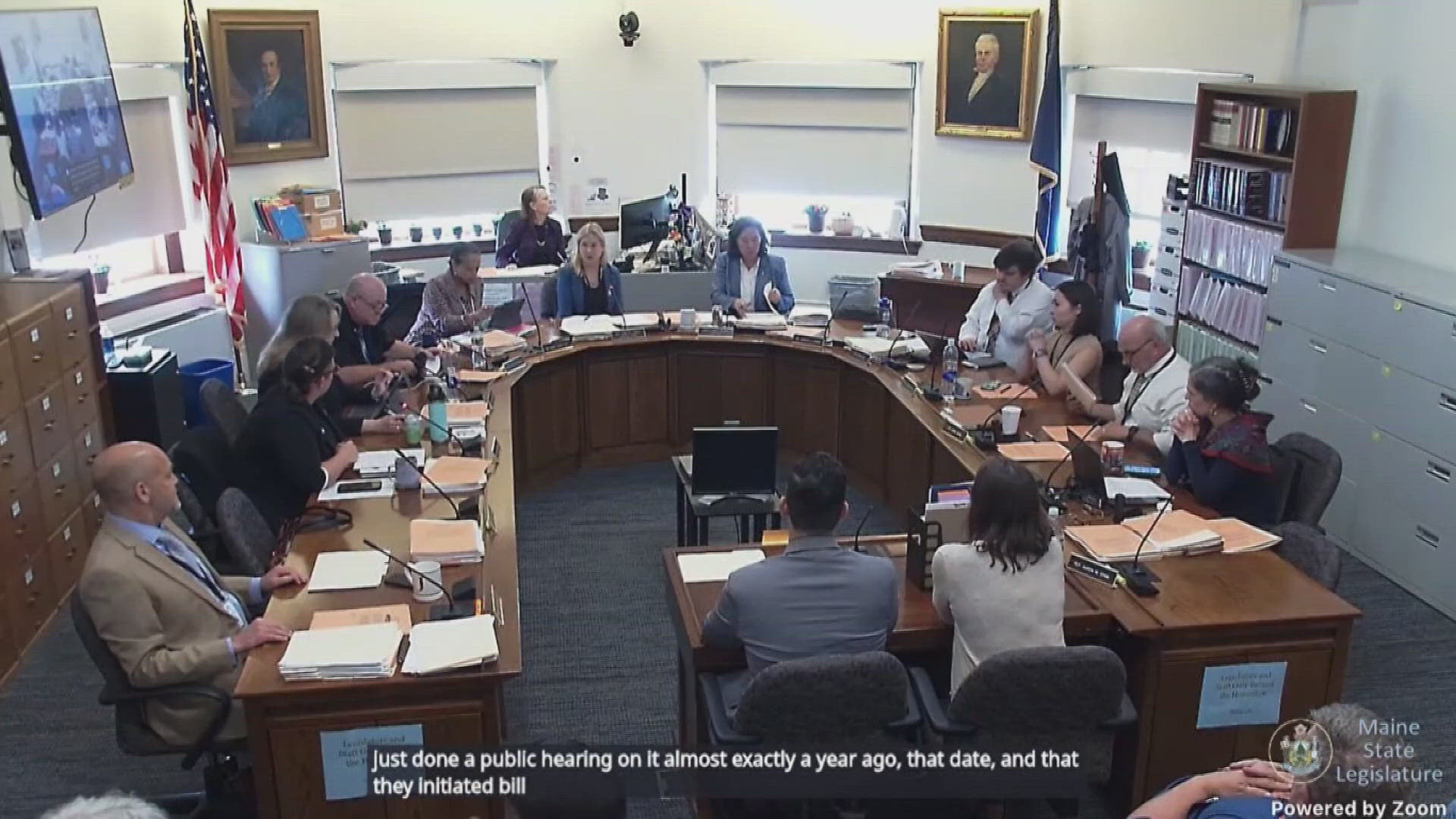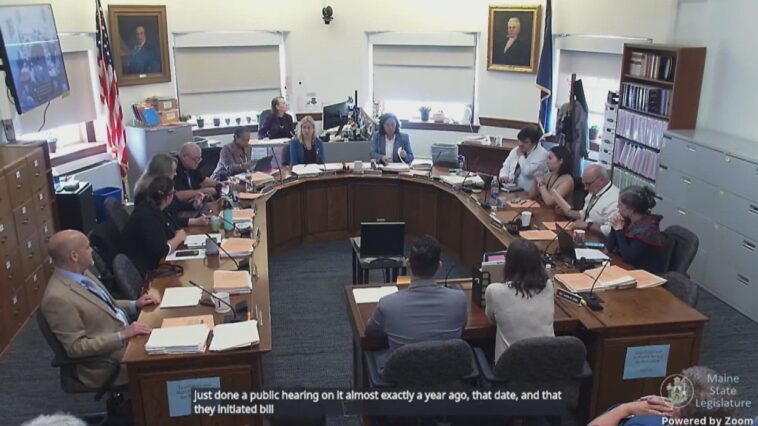
Maine’s Red Flag Debate: A Closer Look at Public Hearings and Citizen Involvement
The current situation in Maine has once again brought the contentious debate over gun control into the spotlight. Lawmakers, alongside the NRA, Gun Owners of Maine, and the Sportsman’s Alliance of Maine, are calling for a public hearing concerning the Red Flag ballot question. This move stands as a testament to the enduring belief that the rights guaranteed by the Second Amendment must be defended, even as proposals for stringent gun control measures circulate. In this opinion editorial, we will explore the various challenging parts of Maine’s current predicament, touch on the problematic twists and turns of the proposal, and examine the role that public participation plays in the enforcement of state law.
At its heart, this debate revolves around a seemingly straightforward mandate: Maine law requires that all ballot initiatives undergo a public hearing. A public forum, after all, is essential for transparency and accountability in the legislative process, allowing citizens to weigh in and share their concerns. However, recent tactics employed by certain lawmakers have cast a shadow of suspicion over the process, igniting questions about democratic participation in legal reforms that could significantly impact the rights of law-abiding citizens.
Why Public Hearings Are Essential for a Transparent Legal Process
A key element of Maine’s legal framework is the requirement for public hearings on ballot initiatives. This mechanism is designed to ensure that everyone has a fair chance to critique or support proposals, thereby safeguarding democratic principles. A public hearing provides not just a platform for argument, but also a mechanism to air the subtle details, fine points, and hidden complexities of any proposal that could potentially alter the legal landscape.
Here are some reasons why the public hearing requirement is so important:
- Transparency: Citizens gain insight into legislative proposals as every detail is brought into the public domain.
- Accountability: Lawmakers are held responsible when they must openly discuss and defend their decisions.
- Community Involvement: Active participation helps levels the playing field, allowing voices from all communities to contribute to the discourse.
- Informed Decision-Making: When multiple perspectives are considered, decisions tend to reflect a more balanced view of public sentiment and legal priorities.
The public hearing process is designed to tackle the confusing bits of legal procedures by making sure that every citizen gets to have a say. It is not merely a formality but a critical tool for ensuring democratic rights and legal accountability.
The Tangled Issues Surrounding the Red Flag Ballot Question
The term “Red Flag” is used to describe measures that allow law enforcement or family members to petition for the temporary removal of firearms from an individual deemed to be a threat to themselves or others. While the intention behind these laws—to prevent potential tragedies—is understandable, the practical application of such measures remains filled with tricky parts and subtle details that can lead to significant unintended consequences.
In Maine, this initiative has sparked heated debate. Critics argue that the language of the proposal is overloaded with issues and tension, potentially leading to scenarios where the rights of law-abiding gun owners could be infringed upon without adequate due process. They stress that while reform is necessary in any legal system, it must be balanced against constitutional protections.
Some of the confusing bits include:
- Criteria for Intervention: Establishing clear standards that determine when someone should be subject to a Red Flag order remains challenging.
- Due Process Concerns: There is a risk that, in a tense situation, laws might be implemented in a way that undermines the fundamental rights guaranteed by the Second Amendment.
- Enforcement Guidelines: The actual procedure for enforcing these laws could be riddled with tension and varied interpretations, making consistent application difficult.
The debate encapsulates the fine balance that lawmakers are trying to achieve: between protecting the community from potential danger and safeguarding the personal freedoms that lie at the very core of American identity.
Senator Carney’s Role: Blocking the Public Hearing and the Public’s Right to Be Heard
One of the most contentious aspects of this saga involves the actions of Senator Anne Carney, Chair of the Judiciary Committee. Critics have observed that her approach in blocking requests for a public hearing—an action deemed necessary under Maine law—has raised concerns about accountability and adherence to established legal procedures. By refusing to facilitate a forum that could unmask the overwhelming problems with the Red Flag initiative, Senator Carney has inadvertently fueled suspicions of political maneuvering over genuine public service.
Her actions, many argue, represent a broader trend of using legal maneuvers to sidestep critical public input. In essence, by shutting the door on a mandated avenue for discussion, she has made it more difficult for citizens and experts to get around the tricky parts involved in evaluating this extreme proposal in a balanced and transparent manner.
Critics point out that such tactics are not new. In the past, similar underhanded maneuvers have been observed when key legislative votes, such as those on repealing certain waiting periods or silencing expert testimony, were obstructed. It is important to recognize that while legislative strategy is part and parcel of any political system, it should not come at the expense of the community’s well-being or democratic transparency.
Impact on Law-Abiding Citizens and Gun Owners in Maine
The controversy in Maine is not merely an abstract legal debate; it has real-world implications for millions of law-abiding citizens. When lawmakers and influential groups, like the NRA and allied organizations, mobilize against what they perceive as an overreach in gun control, it is a signal that the rights afforded under the Second Amendment are at stake.
Gun owners in Maine and across the nation believe that the potential for misuse of the Red Flag laws could set a dangerous precedent. In a democratic society, policies that affect personal freedoms need to be crafted with extreme caution, ensuring that every individual’s right to bear arms is not overshadowed by policies that might be interpreted in a terrifyingly broad manner.
The proposed measures have raised several concerning questions:
- Is there enough clarity in the laws to prevent accidental or unwarranted restrictions on legal firearm possession?
- How might ambiguous definitions and enforcement guidelines allow for small distinctions in interpretation that could ultimately lead to judicial overreach?
- Can law enforcement officials consistently apply these rules in a manner that is fair and respectful of constitutional rights?
These are all nerve-racking questions that deserve thorough and open debate in a public forum. When citizens feel that their rights are being subtly undermined, they are compelled to speak up—a right that is both essential and super important in a functioning democracy.
Working Through the Confusing Bits of Gun Control Legislation
Gun control, as a subject, is loaded with issues and often presents tangled challenges for both lawmakers and citizens. The debate in Maine is a case study of how gun legislation can get bogged down in the complicated pieces that make the legislation seem intimidating and overwhelming. A closer look at the specifics of these measures reveals not only potential overextensions of governmental authority, but also the need for precise language that avoids confusion.
Let’s break down some of the key points:
| Issue | Potential Challenge | Possible Outcome |
|---|---|---|
| Criteria for Red Flag Orders | The legal standards may be too vague, resulting in uneven application. | Potential misuse if the criteria are interpreted with slight differences by different officials. |
| Due Process | Concerns over the ability of citizens to contest orders without facing annoying or nerve-racking bureaucratic hurdles. | Risk of infringing constitutional rights if due process is overlooked. |
| Enforcement Procedures | These procedures could be off-putting to some gun owners who feel the system is skewed against them. | Disparate treatment in enforcement, with some areas potentially facing more severe applications than others. |
This table illustrates the necessity to work through the little details inherent in any amendment-related proposal. Legislation must be designed in a way that allows public input to address these twisted issues before they solidify into law.
Gun Rights Versus Gun Control: The Broader Debate
At the core of this discussion lies an essential conflict: the balance between ensuring public safety and upholding individual rights, most notably the right to keep and bear arms. The debate often gets simplified into a binary choice, where any proposal perceived as in favor of gun control is automatically labeled as a threat to personal freedoms. However, the reality is much more nuanced.
On one side of the debate, advocates for tighter gun control argue that measures such as Red Flag laws are critical in preventing potential tragedies. They contend that by removing firearms from individuals who might be in a state of crisis, society can avert imminent danger. Yet, the devil lies in the details. Even well-intentioned proposals can result in unintended consequences when the enforcement guidelines are not meticulously crafted. The subtle parts of legislative language must be ironed out to ensure that only those who legitimately pose a threat are affected.
On the other hand, gun rights advocates stress that the Second Amendment is a cornerstone of American democracy and protection against tyranny. They argue that any restriction, no matter how minor it might appear, could set a slippery slope leading to more extensive limitations on personal freedoms. For these individuals, ensuring that legal processes—like the mandated public hearing—are fully adhered to is critical.
Key talking points in this broader debate include:
- Respect for Constitutional Rights: Ensuring that any intervention respects the established rights of law-abiding citizens.
- Clarity in Legislation: Avoiding vague language that could lead to varying interpretations and potential abuse.
- Public Involvement: Guaranteeing that every citizen has a chance to contribute to the debate, making the system as democratic as possible.
This healthy debate, though sometimes accompanied by intimidating rhetoric and off-putting accusations, is essential in sustaining the democratic process. It urges citizens to get into the nitty-gritty of the law and to consider its fine shades and little twists before making a decision that could affect the rights of millions.
The Role of the NRA and Related Organizations in Shaping Public Policy
The National Rifle Association and its legislative arm have long considered any attempt to restrict firearm rights as not just a political issue, but a personal one. Faced with emerging proposals like the Red Flag ballot initiative in Maine, these groups have mobilized to ensure that public hearings are held, thus providing a platform for their perspective. Their involvement is not merely symbolic—it represents a broader effort to engage with both lawmakers and the public on the key issues affecting their rights.
NRA-ILA Executive Director John Commerford’s remarks underscore the urgency of holding a public forum. According to his statement, the refusal to convene a mandated hearing by Senator Carney is seen as a blatant disregard for state law. In his view, the silence from certain political figures effectively silences the voices of law-abiding citizens who are concerned about radical proposals that may compromise their rights.
By standing together with allied organizations like the Sportsman’s Alliance of Maine and Gun Owners of Maine, the NRA is not advocating for unchecked access to firearms. Rather, it is reinforcing that the legal and cultural traditions enshrined in the Second Amendment must be upheld. Their commitment is to ensure that any legislative reform is balanced and does not ignore the essential process of public participation.
This coordinated approach emphasizes the following key points:
- Defense of Constitutional Guarantees: A unified message that the rights provided by the Second Amendment should remain intact.
- Responsiveness to Public Demand: Ensuring that every law-abiding citizen can voice their support or concern regarding government proposals.
- Holding Lawmakers Accountable: Challenging any attempts to sidestep legal mandates designed to protect citizens.
This proactive strategy is an essential component of a sound legal framework, allowing citizens to figure a path through legislative changes while safeguarding their freedoms.
Government Transparency and the Importance of Accountability
One of the more disheartening aspects of the current debate in Maine revolves around issues of government transparency. When public hearings—designed to demystify legislative proposals—are blocked or altered through political maneuvering, the entire process becomes loaded with problems. Without full disclosure of the small distinctions and subtle details embedded in the law, the process can become as nerve-racking as it is opaque.
The principle of government accountability is super important. By ensuring that all legislative proposals are presented in a public forum, citizens have the opportunity to poke around the proposals and bring to light any hidden complexities or confusing bits that might otherwise be overlooked. This open process is vital not only for maintaining trust in public institutions but also for ensuring that the law accurately reflects the desires of the community.
Further actions to enhance transparency could include:
- Regular public updates on the progress of legislation.
- Open forums or town hall meetings where citizens can directly question their elected officials.
- Detailed documentation and explanation of each proposed change to provide clarity on how it might affect constitutional rights.
These recommendations are not meant to interfere with the legislative process but rather to support it. When lawmakers take the time to fully explain their proposals, citizens are better able to steer through the confusing pieces of new legislation and make informed decisions at the ballot box. The more open the process, the less room there is for misinterpretation or misuse of legal provisions.
The Broader Impact of Red Flag Laws on U.S. Gun Legislation
Maine’s situation is just one example among many in the broader national debate over gun legislation. Similar battles are unfolding at both state and federal levels, where proposals affecting gun regulations are met with both support and significant resistance. Across the country, various legislative bodies are grappling with the challenge of balancing public safety with constitutional freedoms.
For instance, recent moves in the U.S. House of Representatives—such as the passage of bills that alter the status of suppressors under the National Firearms Act—reflect a growing trend toward legislative overhaul. While some view these changes as necessary updates to outdated laws, others worry that they may pave the way for further restrictions on gun rights.
This national scenario shares common threads with what is happening in Maine:
- Both debates are full of problems that require careful review and public input.
- State and federal measures alike must contend with the subtle details of legal language that can make all the difference in protecting citizen rights.
- Open public hearings and transparent legislative processes are a must-have to ensure that changes in law benefit rather than harm the public interest.
As these discussions continue, it becomes clear that each legislative move can have ripple effects across the country. When one state, like Maine, finds itself embroiled in a debate over public hearings and the fine points of proposed gun control measures, it serves as a warning to other states about the potential dangers of sidelining citizen involvement in the legal process.
Proactive Measures for Ensuring Fair Legislative Processes
In light of the challenges posed by the Red Flag initiative and similar proposals, it is critical that both lawmakers and the public adopt proactive measures to ensure that all legal proceedings are carried out fairly. The first step is to reinforce the importance of public hearings. Such forums are key to exposing the intricate twists and turns of controversial proposals, thereby enabling citizens to provide feedback, ask important questions, and ultimately steer the conversation in a way that preserves fundamental rights.
Some strategies that could be employed to ensure a balanced legislative process include:
- Mandating Open Consultations: Legislation should legally require that before any vote is cast, a comprehensive public consultation takes place. This would involve scheduled hearings, written submissions, and public debates.
- Engaging Independent Experts: Including neutral legal experts and public policy analysts can help explain the tricky parts and complicated pieces of proposed regulations in clear, understandable terms.
- Increasing Legislative Accountability: Elected officials must be held accountable for ensuring that all procedural requirements—such as public hearings—are met. Failure to do so should be met with appropriate political and legal repercussions.
These strategies not only help in shedding light on the tangled issues present in the legislative process but also reassure the public that their voices are indeed being heard. When citizens feel empowered to actively participate in the rule-making process, the resulting laws are more likely to be robust, balanced, and reflective of the community’s needs.
Ensuring a Balanced Approach to Gun Control and Gun Rights
While the debate over Red Flag laws can sometimes seem overwhelmingly intense, it is crucial that the discussion remains balanced. Advocates for responsible gun control measures believe that any initiative should be thoroughly examined for its potential to protect the community, while simultaneously preserving the rights enshrined in the Constitution. On the other hand, gun rights defenders are just as concerned about protecting the key freedoms that allow for personal defense and democratic participation.
To achieve a balanced approach, lawmakers and public policymakers must:
- Address the Small Distinctions: Every fine shade of legal language must be scrutinized so that the final law does not inadvertently penalize law-abiding citizens.
- Implement Checks and Balances: Ensure that any temporary measure, such as a Red Flag order, includes robust and fair hearings that allow affected individuals to contest or clarify the situation.
- Focus on Evidence-Based Policy: Decisions should be driven by data and successful examples from other states, rather than by fear or political pressure.
This balanced approach is essential. When both sides of the debate are given space to present their arguments, a clearer picture of the true impacts of new legislation emerges. The key is not to demonize a proposal outright simply because it might reduce firearm-related violence, but to critically evaluate whether it does so without infringing on the rights of citizens who follow the law.
Looking Ahead: The Future of Gun Legislation in Maine and Beyond
This ongoing debate in Maine offers a snapshot of the larger challenge facing the nation: how to manage your way through in a legal landscape that is continuously evolving. As the state wrestles with the Red Flag ballot initiative, citizens, lawmakers, and advocacy groups must all take a closer look at the processes that determine how our laws are made.
The focus must now shift to ensuring that any future legislative action is characterized by transparency, accountability, and genuine public engagement. Every step—from the crafting of a proposal to its final implementation—should involve community input to help untangle the confusing bits and subtle intricacies of gun control policy.
It is clear that the coming years will continue to be charged with challenging discussions over gun legislation. Whether at the state level with Maine’s Red Flag debate or on the national stage with other key legislative reforms, the underlying message remains consistent: every citizen’s right must be respected, and every law must pass through an open, scrutinizing public forum. Only then can we hope to reconceptualize firearm policy in a way that truly balances public safety with constitutional rights.
The future of gun rights and gun control in America is not predetermined. Instead, it is being actively shaped by the engagement of law-abiding citizens, their elected officials, and advocacy groups that insist on fairness and legal transparency. The need for a public hearing on the Red Flag ballot initiative in Maine is more than a procedural formality—it is a stand for democratic principles and an affirmation that every voice matters.
Conclusion: The Road to Fair and Transparent Legislation
To wrap up, it is important to recognize that the debate surrounding Maine’s Red Flag referendum encompasses many of the tricky parts and complicated pieces seen in modern legislative battles. The refusal to hold a public hearing not only undermines state law but also sidesteps a necessary opportunity for citizens to dig into the fine points of a proposal that could have long-lasting effects on their rights.
The current scenario serves as a reminder that every piece of legislation, especially those that impact fundamental rights, must be approached with both caution and respect for the democratic process. Whether you are a supporter of gun rights or an advocate for stricter controls, the pathway to progress is paved with mutual respect, transparent dialogue, and a steadfast commitment to the constitution.
As we look ahead, we must manage our way through the twists and turns of legislation by keeping citizens at the center of the decision-making process. By insisting on public hearings, calling for clarity in legal language, and upholding the right to fair and open debate, Maine—and indeed, all states—can navigate the nerve-racking challenges of gun control policies without sacrificing core freedoms.
It is not merely a question of political allegiances but of preserving a system of law where every individual’s rights are critical. As debates over initiatives like Red Flag laws continue, it becomes increasingly evident that the key to sustaining an equitable legal system lies in an enduring commitment to transparency, accountability, and most importantly, genuine public participation.
In these times of intense political polarization, let us remember that the ultimate goal is to create a society where laws reflect the will and the welfare of its people. Whether the solution lies in reform, revision, or even rejection of questionable measures, a thorough and inclusive legislative process is the best means to safeguard our freedoms. Only then can we ensure that the future of gun legislation harmonizes with the timeless principles enshrined in the Constitution.
Now is the time for all citizens, legal experts, and lawmakers alike to come together, take the wheel, and work through the tangled issues head-on. By doing so, we can build stronger, more transparent policies that protect both public safety and individual liberties for generations to come.
Originally Post From https://www.nraila.org/articles/20250602/maine-lawmakers-nra-and-state-gun-rights-group-demand-red-flag-hearing
Read more about this topic at
The Essential Second Amendment
Protecting Second Amendment Rights


